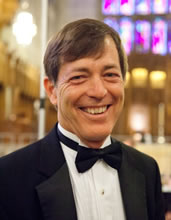Make every effort to get a ticket for one of the two remaining performances of Handel’s Messiah in the resplendent Duke University Chapel. Rodney Wynkoop, director of Chapel Music, has set a very high standard for this Triangle Christmas series that began in 1932, before the chapel was completed in 1935. This run of performances has an extraordinarily strong roster of powerful vocal soloists. These combined with the polished excellence of the Chapel Choir and the Orchestra Pro Cantores made for an occasion of special frisson. You would be hard-pressed to hear a finer live performance, and the Medieval atmosphere accentuates the experience. Get in line an hour or more before the Chapel opens to get prime front pews or sit at the back where the acoustic gets focused again.
Wynkoop had his forces prepared superbly. No one is better at balancing soloists, chorus, and orchestra within the Chapel’s challenging long reverberation time. More important is his mastery of dramatic pacing, building the three parts to a satisfying apotheosis. The orchestra was made up of members of some of the finest symphony orchestras and free-lancers in the state. Ciompi Quartet violinist Eric Pritchard played his several important solos brilliantly; the one in the Part III soprano air, “I know my Redeemer liveth,” was memorable. Don Eagle’s trumpet has never resounded more brilliantly. Continuo support was often given by violinist Pritchard, violist Scott Rawls, cellist Virginia Hudson, and not least, David Arcus, playing on a chamber organ and harpsichord. Arcus is playing his final continuo role for this series and Wynkoop brought him forward for special applause at the end of the concert.*
This performance’s special sense of occasion was evident from the first solo recitative and air, “Comfort ye my people,” sung powerfully by tenor John Bellemer with a clarion ring combined with warmth. When bass Kevin Burdette uttered “Thus saith the Lord of Hosts,” I wondered if UNC Chapel Hill’s seismograph might register the energy and command of his deep, sepulchral voice. His recitative and air in Part III, “The trumpet shall sound,” was magnificent. Both singers’ diction was impeccable.
The enunciation and projection of the two women soloists were excellent. Alto Meg Bragle‘s voice was even across its range, and she showed great care for the meaning of the words. Her performance of Part II’s “He was despised and rejected of men” brought out new, deeper aspects of the text. Soprano Robin Johannsen brought an almost instrumental purity to the quality of her singing; her voice was beautifully focused and seemingly seamless. All four soloists had marvelous intonation. The two duets, Part I’s “He shall feed his Flock,” sung by Bragle and Johannsen, and Part III’s “O death, where is thy sting?” sung by Bragle and Bellemer,” were simply outstanding.
The ornamentation used by all four soloists was a constant pleasure to hear.
The Chapel Choir was in top form whether in the sprightly Part II chorus “All we, like sheep,” the rousing traditional “Hallelujah!” or the arresting Part II number, “Since by man came death.” The choral parts were always clear, and the fugal final “Amen” was a delight.
Messiah continues on December 7 and 8. For details, see the sidebar.
*From the program booklet: “It is with great sadness that Duke Chapel announces that this weekend’s performances … are the final ones in which Chapel organist David Arcus will participate. [H]e announced that he would step down at the end of 2013.”











